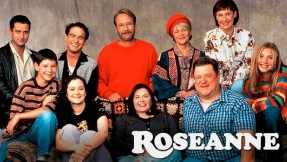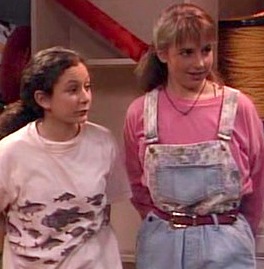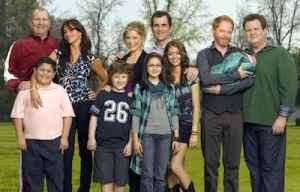Why ‘Roseanne’ Remains One of the Best Portrayals of Family in American Sitcom History
There is a lot about modern entertainment that hinges on the audience’s ability to suspense their disbelief. We, the audience, are asked to overlook plot holes, ignore poorly explained or missing exposition, and confusing relationships between plot conveniences and the laws of nature. For sitcoms, we are expected to believe that there are really people who can come up with witty retorts in an instant and that wacky situations are easy to stumble into. What sitcoms ask us to believe of families is even more surreal: every member has his or her own specific defining characteristic that shapes all of their behavior, often that fits in with their position in the familial hierarchy. Or, in layman’s terms, every character is a walking stereotype.
This is often accepted among audiences that this is the standard model, that’s just the way things are with sitcoms about families. Real families aren’t funny; you watch TV to get away from the strife and annoyances of your blood relatives, so an idealized easy-to-swallow version of family is often more appealing. One show, however, managed to provide a genuinely loving, realistic, and comedic portrayal of family, and became immensely popular in its original run and through syndication.

Roseanne is a sitcom that ran for nine seasons (from 1988 to 1997) on ABC, which dealt with the daily lives of working-class Illinois family the Conners. This included titular character and mother Roseanne, father Dan, daughters Becky and Darlene, and youngest child D.J., as well as Roseanne’s sister Jackie who appeared in nearly in every episode. Each episode dealt with specific issues in their daily lives, which could range from the comedic, such as Jackie sleeping with her ex, to dramatic, such as Becky eloping with her boyfriend, to political and social, such as when son D.J. does not want to kiss a black classmate in a school play. While the show officially ended with a controversial episode, reruns can still be viewed on a number of different networks, if this article peaks yours interest.
What makes Roseanne unique, in part, is that none of the characters fall into the typical sitcom family stereotypes. There are lots of different stereotypes concerning families and family members in various sitcoms. There is the Father Knows Best model, with the all-knowing father, doting and sometime misguided mother, and perfect children with mundane moral dilemmas, which dominated sitcoms in their early forms during the 1950s-1970s. The Parody model, as seen in The Simpsons and Family Guy, show a clueless, and often fat, father, wise but doting mother, dumb son, smart and/or unpopular daughter, and the baby (though this can refer to an actual baby or merely the youngest member of the family).
There are many shows that represent nontraditional American family structures on television that don’t use these particular stereotypes, but often fall on new ones that have become the norm. Both Diff’rent Strokes and Webster portrayed an inter-racial family, one with a white father and daughter and two black adopted sons, and the other with two white parents and an adopted black son. Blossom and Punky Brewster also explored families with single fathers, though in Blossom a step-mother arrives in season 4. The Nanny looked at a family where the primary caretaker was a father who was aided by a nanny from a different socio-economic class. Sister Sister was about twins separated at birth with single parents become one family with parents who are not in a romantic relationship. Even The Brady Bunch, one of the most saccharine of family sitcoms from the 1970s, portrays a non-traditonal structure with two families with single parents becoming one and learning to live together. Still, despite of these different forms of family, characters remain settled into their stereotypes. Spunky, outgoing intellectual or highly popular, attractive daughters, dumb jock or scheming sons, mischievous young children, clueless but loving fathers, and wise but off-kilter or ditzy mothers.
Roseanne defies the classic (and in some cases modern) stereotypes with good story-telling and a basic understanding of the human psyche. Roseanne and her husband Dan are both quick-witted loving people who are on equal footing. Dan never talks down to Roseanne and expects her to do “wifely duties” nor does Roseanne ever chastise Dan for not being enough of a man when he loses his job or when the bike shop fails.They are good parents who try to raise their children without pressuring them or hovering over them, and yet often make mistakes. Neither Becky nor Darlene were considered “the smart one” or “the popular one” – both had good grades, enjoyed school to an extent, and had relatively active social lives. They got in trouble like all kids do, and fought with their parents and each other, but they also grew and matured. This is most obvious with Darlene, who begins the series as a basketball loving tomboy, and ends the series as a mature (albeit a little morbid) writer who retains her love of basketball but also has become more socially conscious.

Roseanne is also unique because it dealt with some of the most troubling issues on television and didn’t feel the need to always end the episode in a neat and comforting way. The aforementioned racism episode (Season 7 Episode 9: White Men Can’t Kiss) contains the plot where DJ does not want to kiss a black classmate in the school play. Roseanne and Dan tell him that he should and that skin color doesn’t matter. However, cleverly enough, when Jackie and Roseanne are closing down their restaurant they become scared when a black man appears at the door, and refuse to open it for him. Roseanne only opens the door when he reveals that he’s the black classmate’s father, who accused them of holding the same prejudices. After he leaves, Jackie says, “If he was a white guy, with the exact same build and the exact same clothes, you would have done the exact same thing,” to which Roseanne replies “Yeah, well I’m glad one of us is sure.” This reveals Roseanne and Jackie’s own inherit prejudices and how even those who claim not to be racist might act differently in real life situations, and Roseanne realizes this with much shame. This isn’t the only episode that dealt with difficult issues, some even discussing the issue over many episodes. In Season 7, there were several episodes where the question of abortion after complications arise concerning Roseanne’s unborn fourth child. The show was also known for including homosexual and bisexual characters in relationships and were treated as more than just walking stereotypes.
Not every sitcom would go this route, especially not with a topic that is so sensitive and so important. In comparison, in the infamous drugs episode (Season 5 Episode 22: The Reporter) from Diff’rent Strokes Arnold discovers drugs are being sold on school grounds. Rather than dealing with the reality of drugs in schools or how it is a symptom of inner-city poverty, they bring then First Lady Nancy Reagan to deus ex machina the problem away with her anti-drug campaign, as if it were all that easy. The Simpsons even pokes fun at this necessity to have plot lines resolve big, complex issues in 22 minutes. When Lisa develops an eating disorder (Season 16, Episode 3: Sleeping with the Enemy), her father Homer says everything is back to normal now that bullying at her school as stopped and Lisa is all better. When she says that eating disorders are often life long afflictions and that it cannot be solved so easily, Homer attempts to coerce her into saying that everything is fine. The issue is, of course, never spoken of again. Thus, when sitcoms attempt to tackle big issues without the complexities and gravity they warrant, the problems come off as simple and that should only be reserved for occasional discussion rather than continual conversation.
Not all episodes dealt with such heavy hitting topics although they were always grounded in reality. In the first season, Roseanne and Jackie work in a plastic factory as line-workers. During one episode, Roseanne and her co-workers get a new manager and higher quotas to fill (Season 1, Episode 23: Lets Call It Quits). The new manager agrees to lower the quotas if Roseanne promises to stop disrespecting and mocking him in front of the other workers. This is a hard pill to swallow for her – she has always been the wise-cracking member of the group, and she loathes him, but she needs to keep her job and doing so will help the other workers. The supervisor abuses his power in varying degrees which ultimately forces Roseanne to quit even though she desperately needs employment. Even with an episode as simple as this, with all the witty humor we’ve come to expect from the show, Roseanne manages to express a sentiment felt by hundreds if not thousands of American families. The show portrays a working class family without the Hollywood frills, showing characters working in miserable, degrading jobs in order to keep afloat, and have to decide if it’s worth mental and physical suffering or not. In a way, Roseanne attempted to connect with its audience on a deeper level, portraying parts of everyday life with a bit of humor, almost in .

Arguments could be made that even as we progressed further in the realms of more realism in sitcoms throughout the early 2000s. While shows like Friends, Scrubs, and How I Met Your Mother changed the way sitcoms were viewed, family-focused sitcoms became less prevalent and popular. Cult classic Malcolm in the Middle presents a more down-to-Earth family of simple, working class people but still continues of the tradition of making the mother and father caricatures rather than regular parents as well as having over-the-top antics. Modern Family on ABC has received praise for its portrayal of, as its title suggests, modern families that defy the typical model. The show looks at three family structures: the typical hetero-normative family structure, two husbands and a child, and a second marriage between an older man and younger woman (which also happens to be interracial). While the show has been praised for including, and therefore validating, these non-traditional structures, they also relay on certain stereotypes for easy, readily identifiable characters and humor, but has managed to retain some of the genuine family moments and heart that have been lost in other sitcoms. In fact, Modern Family is probably the closest in quality to Roseanne, even if in its later seasons focused more on comedy than on the families themselves.
It is ultimately the message of Roseanne that truly stays with audiences, and it is a beautiful one. What the show boils down to is that family is everything. The Conners suffer financial and familial problems at every turn, never really making it out of their difficult situation, but always come together to share what little they have and enjoy each other’s company. Even in the opening credits, we see the family coming together for activities ranging from take-out dinner to chaotic card games, laughing and shouting and living day to day. Even in poverty, illness, disagreements, and uncertainty, the Conners are always there for each other. They make express their affection and caring through witty retorts, hassling comments, and some hostility, but they ultimately stand together as a real family, like the ones that functions even when the TV screen is off.
What do you think? Leave a comment.











This show is deserving of any praise it gets, for both its humorous and dramatic content. It may not be the greatest thing ever on TV, but it’s first several years made for a very fine show.
This show’s actors made this one of the funniest show ever!
I really liked some of the late episodes, like the one where Dan’s mom comes out of the hospital, or the one where the family is held hostage on a train.
I’ve seen every episode of “Roseanne” several times. It definitely is one of the better sitcoms to come from the history of American television–though I frequently pretend the finale never happened. Pretty much everything you said about the series is why I love it. It knew when to have its serious moments, like this fight between Roseanne and Dan (http://www.youtube.com/watch?v=DDRwcAvh5kg), and it did the serious moments well. But what I also loved about the series is that it could also take a serious topic and make it humorous. I’ve lost track of how many shows have done an episode about drugs and have made it 100% solemn and serious. “Roseanne” did an episode about pot, and it was, in my opinion, one of the most hysterical episodes in the entire series. I mean, when Dan and Roseanne are high in the bathroom, and then Jackie is also high in the bathtub thinking she has shrunk and is actually in the sink is one of the funniest things I’ve seen. I can’t think of any other sitcom that took such a lighthearted approach to drugs, which I greatly respect the series for doing. That was completely revolutionary. I also loved how the show didn’t treat their audience like idiots. My mind goes to every time the Becky’s would switch (Becky 1 & 3 – Lecy Goranson, and Becky 2 & 4 – Sarah Chalke). Every time the new one would come on, the show would openly acknowledge the switch, which was hilarious. For example, when Becky 2 first came on, at the end of her first episode the entire family is sitting around the TV discussing the Darren switch on “Bewitched,” and Becky mentions how she likes the second Darren much better. Or when Becky 1/3 comes back for the first time after leaving, Roseanne says to her, “Where the hell have you been?” I could keep going on and on why I love this series….
I found your article to be very well-written and refreshing. I like your perspective because most television scholars criticize sitcoms for their presentation of certain American ideals, i.e. Leave it to Beaver, but you show how certain sitcoms like Roseanne can be valuable and aren’t necessarily ideologically problematic.
Norm Macdonald, of SNL, wrote on this show and once told of his experience in the writers room and how he gained respect for Roseanne Barr. Norm expressed that all of the writers were Harvard writers who didn’t really know ‘funny’ because the audience members in sitcoms at the time (and even more so today) are not really audience members, but part of the show and are encouraged to laugh even if the joke was not funny. Roseanne would challenge and fight every script, telling these formulaic writers that the script was horrid and that they would have to rewrite it. In short, is was good because Roseanne cared.
I recommend to anyone who liked this show to take a look at the HBO show “Lucky Louie,” which was created by the now reverent Louis CK. It is in the same vein as “The Honeymooners,” but with Louis CK’s candid, but goodnatured, brand of comedy that he has now achieved great success with.
I’m glad I stumbled upon this excellent article. It’s one of the most comprehensive pieces I’ve ever read about this excellent, excellent show.
In the second to last paragraph, you mention that family-focused sitcoms became less prevalent in the 2000s, then you jump from Malcolm in the Middle to Modern Family. However, it seems like the the early-mid 2000s was filled with a reversion to non-realistic family sitcoms that started a father figure who had to deal with the antics of his wife, kids, in-laws, etc (The War at Home , According to Jim, Grounded for Life, Still Standing, Yes, Dear, to name a few). None of them were anywhere near as realistic as Roseanne.
Also, some might say that while Roseanne was a strong woman character, she was a little too unrealistically strong. She was essentially head of the household, which, as portrayed, wasn’t the most accurate look at blue collar home life.
Wonderful article. Obviously written by someone that grew up watching Roseanne.